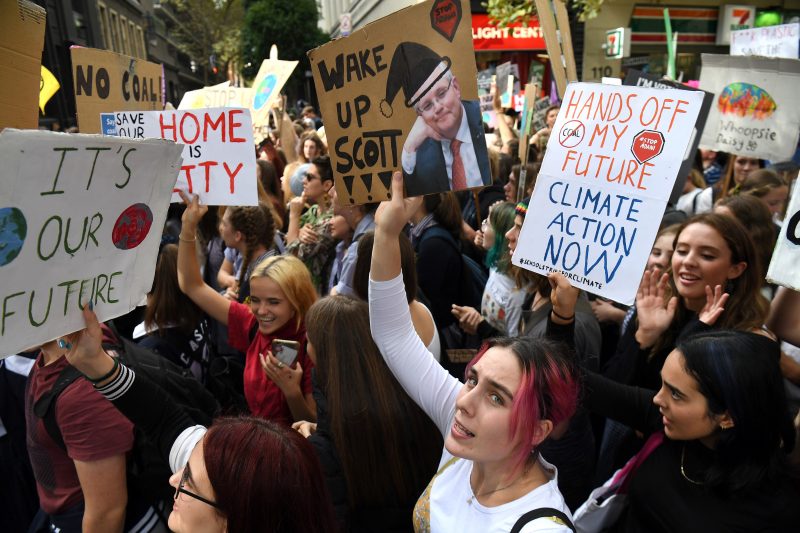Aussie election could have global climate impact
Despite climate protests against the Liberal Party during the election campaign, the climate-change sceptical coalition secured victory in the weekend’s vote — which could have global implications (William WEST)
Sydney (AFP) – Brutal droughts, floods and wildfires were expected to make the environment a pivotal issue in Australia’s election, instead victory for the climate change-sceptic Liberal party could have global implications.
Australia’s Liberal-National coalition secured victory late on Saturday night despite polls suggesting an opposition Labor Party win.
In coal-rich Queensland, voters swung hard to the government fearing a Labor government would curb mining projects and cost them jobs.
Concerns that Labor would block the creation of the massive Indian-backed Adani coal mine helped voters abandon the party in their droves.
The northeastern district of Herbert had been the most marginal seat at the last election, with only a 0.02 percent difference between the main parties. This time the Liberals took 58 percent of the vote.
That result — and others like it — could have ramifications far beyond Australia.
– ‘Emissions superpower’ –
In the emissions stakes, Australia is a minnow compared to the bellowing economies of China or the United States.
But its role as the world’s largest coal exporter gives the country outsized influence in the climate stakes.
Experts say the coalition government’s election victory makes it much more likely that the Adani project will go ahead.
Eventually, they say, billions more tonnes of coal will be available to export and burn in places like India.
“It is probable that they will push for the final approvals to go through as quickly as possible,” Samantha Hepburn, an energy and resources law expert at Deakin University, told AFP.
The Labor-led Queensland state government — which also has a say — is likely to come under enormous pressure to approve the project despite concerns about the environment.
“Adani is the thin edge of the wedge,” said Hepburn.
The wider area around Adani — known as the Galilee Basin — is believed to have enough coal to produce up to 600 million tonnes a year, she said.
“Approving Adani will provide a strong precedent for the development of further mines in the area.”
– Debate continues –
However, conservatives weren’t successful across the board. While Saturday’s election was a win for those who want the jobs and wealth that mining brings, the victory was not decisive.
Early on election night, former prime minister — and climate change-denial poster boy — Tony Abbott stood before supporters and strained to be gracious in defeat.
After 25 years representing Sydney’s affluent northern beaches, eco-minded voters had decisively booted him from office, electing Zali Steggall — an Olympic skier who campaigned on climate change — instead.
The polarising 61-year-old failed spectacularly to read the public mood in his backyard, but he may have nailed the broader national trend.
“Where climate change is a moral issue, we Liberals do it tough,” Abbott said, lamenting his own fate.
“Where climate change is an economic issue, as the result tonight shows, we do very, very well.”
– Issues within coalition –
Several climate-friendly candidates secured a place in parliament or gained ground on climate-sceptic ruling Liberals. Not all were in affluent urban areas.
In one district nestled amid the Australian Alps and the Murray River, an independent ran and won on an environmentalist platform.
Within his own party, Prime Minister Scott Morrison will now have to navigate between climate deniers emboldened by victory and moderates who are feeling the electoral heat for the government’s hardline policies.
“These are issues that are difficult internally for the coalition,” Marija Taflaga, a political scientist at the Australian National University, wrote in a recent commentary that highlighted additional outside pressures.
“He will need to address climate policy because business wants a price signal for carbon emissions.”
Farmers — who are worst hit by floods, droughts and fires — are also starting to demand action to curb the effects of climate change.
With influential climate hardliner Abbott out of the way, Morrison may have a little more room for manoeuver.
But the former prime minister’s exhortation to voters to choose between “jobs or climate” looks set to dominate Australia’s politics well into the future.
Disclaimer: Validity of the above story is for 7 Days from original date of publishing. Source: AFP.


